A guide to Labour Party anti-Semitism claims
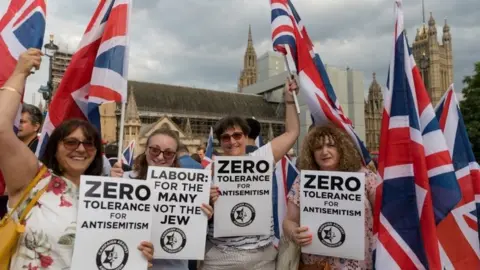 Getty Images
Getty ImagesThe internal Labour row over anti-Semitism has dragged on for several years. Here's a guide to what's been going on.
Investigation
In October 2020, a report by the UK's human rights watchdog found Labour to be responsible for "unlawful" acts of harassment and discrimination during Jeremy Corbyn's four-and a-half years as party leader.
The Equality and Human Rights Commission (EHRC) investigation identified serious failings in leadership and an inadequate process of handling anti-Semitism complaints.
Its report said the party was responsible for three breaches of the Equality Act: political interference in anti-Semitism complaints, failure to provide adequate training to those handling anti-Semitism complaints and harassment.
In a statement, it said: "The equality body's analysis points to a culture within the party which, at best, did not do enough to prevent anti-Semitism and, at worst, could be seen to accept it."
The commission served an unlawful act notice on the party, meaning it has to produce an action plan within six weeks, which is legally enforceable by the courts if not acted upon.
The inquiry was launched in May 2019 after "receiving a number of complaints about allegations of anti-Semitism in the party".
Responding to the report, Labour leader Sir Keir Starmer said it was "a day of shame for the Labour Party" and apologised to the Jewish community.
He said the party would implement all the report's recommendations in full and promised a "culture change" in Labour.
He added: "Under my leadership, zero-tolerance of anti-Semitism will mean precisely that. If you're anti-Semitic, you should be nowhere near this Party. And we'll make sure you're not.
"And if - after all the pain, all the grief, and all the evidence in this report, there are still those who think there's no problem with anti-Semitism in the Labour Party, that it's all exaggerated, or a factional attack, then, frankly, you are part of the problem too. And you should be nowhere near the Labour Party either."
Corbyn suspension
Sir Keir's predecessor as leader, Jeremy Corbyn, said he did not accept all of the report's findings but expressed the hope that the recommendations would be "swiftly implemented".
He said "anyone claiming there is no anti-Semitism in the Labour Party is wrong" but added that "the scale of the problem was also dramatically overstated for political reasons by our opponents inside and outside the party, as well as by much of the media".
Labour suspended Mr Corbyn from the party and removed the whip, meaning he would no longer be part of the Parliamentary Labour Party.
In a statement, the party said: "In light of his comments made today and his failure to retract them subsequently, the Labour Party has suspended Jeremy Corbyn pending investigation."
Three weeks later, Labour's ruling body - the National Executive Committee (NEC) - decided to readmit Mr Corbyn as a party member.
But this did not mean he would automatically be reinstated as a Labour MP, and Sir Keir decided not to restore the whip to his predecessor - meaning Mr Corbyn will continue to sit in the House of Commons as an independent.
Sir Keir promised to keep the situation under review, but allies of Mr Corbyn have urged him to change his mind immediately, saying the former leader is being "persecuted".
What is anti-Semitism?
Jewish people have faced prejudice and hostility for centuries. During World War II, six million Jews were murdered by the Nazis or their accomplices in what is known as the Holocaust.
Modern-day anti-Semitism can take many forms including, but not limited to, conspiracy theories about Jewish control of the global financial system and the media, to attacks on synagogues, verbal abuse or hate speech and abusive memes on social media.
In 2018, anti-Semitic hate incidents in the UK reached a record high, according to the Community Security Trust, which monitors them.
In 2016, the International Holocaust Remembrance Alliance (IHRA) adopted a working definition of anti-Semitism which described it as "a certain perception of Jews, which may be expressed as hatred toward Jews".
The UK and a number of other IHRA members have adopted or endorsed the working definition, as well as a series of accompanying "contemporary" examples of how anti-Semitism manifests itself in public life.
These include Holocaust denial, denying the Jewish people their right to self-determination (through the existence of a State of Israel), and holding Jews collectively responsible for the actions of that state.
Labour got itself into trouble over the definition - as we'll explain later.
How does it relate to Israel?
 Reuters
ReutersDebates about anti-Semitism in Labour often involve Israel and the term "Zionism".
In its modern sense, Zionism refers to support for Israel's existence and prosperity. It began as a political movement in Europe in the late 19th Century which sought to develop Jewish nationhood in the land known as Palestine - also known to Jews as the ancient Land of Israel.
The movement evolved and eventually led to the creation of the State of Israel in 1948.
Some say "Zionist" can be used as a coded attack on Jewish people, while others say the Israeli government and its supporters are deliberately confusing anti-Zionism with anti-Semitism to avoid criticism.
Attitudes to Israel in the UK, and on the left in particular, are influenced by its troubled relationship with its Arab neighbours and its long conflict with the Palestinians.
A 2016 report by the Home Affairs Committee of MPs backed the IHRA definition of anti-Semitism but said it should include an additional statement to maintain freedom of speech "in the context of discourse about Israel and Palestine".
This, it said, should read "it is not anti-Semitic to criticise the Israeli government without additional evidence to suggest anti-Semitic intent" or to hold Israel "to the same standards as other liberal democracies or to take a particular interest in the Israeli government's policies or actions, without additional evidence to suggest ant-Semitic intent".
What is the Labour anti-Semitism row about?
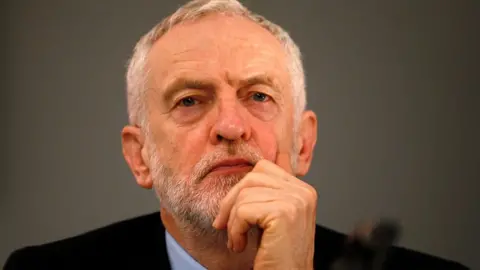 Reuters
ReutersAnti-Semitism was generally not regarded as a big problem in the Labour Party before Jeremy Corbyn's election as leader in September 2015.
Mr Corbyn and his allies on the left had spent decades campaigning for Palestinian statehood, in contrast with the more nuanced position taken by many of his predecessors.
Under his leadership, there was an influx of new members, many of whom were vocal critics of Israel and who believed the UK, along with the US, should be tougher towards Israel, especially regarding its policies towards the Palestinians and its building of settlements in the occupied territories.
As the balance of power within Labour changed after Mr Corbyn's election as leader, attention quickly focused on what activists and elected representatives were saying - and had said in the past - on social media and elsewhere about Israel and Jewish people.
There were claims that anti-Semitic tropes were being widely propagated and a number of incidents attracted a great deal of attention.
There were a string of high-profile suspensions over alleged anti-Semitic comments - and constant accusations, from Jewish groups and some of his own MPs, that Mr Corbyn and his team were failing to take the issue seriously enough.
The row threatened to the tear the party apart, with several high-profile MPs walking out over abuse they received.
Mr Corbyn repeatedly insisted that anti-Jewish hate would not be tolerated in the party, but critics said he was not doing enough to root out the problem.
In April 2018, Jennie Formby, an ally of Mr Corbyn, took over as Labour's general secretary and set about tightening up the party's disciplinary procedures and recruiting more staff to deal with anti-Semitism cases.
The full story of the controversies over Mr Corbyn's position on anti-Semitism in the Labour Party are set out below.
But let's now look at efforts by the man elected to replace him as leader in March 2020, Sir Keir Starmer, to draw a line under the issue.
What action is Sir Keir Starmer taking?
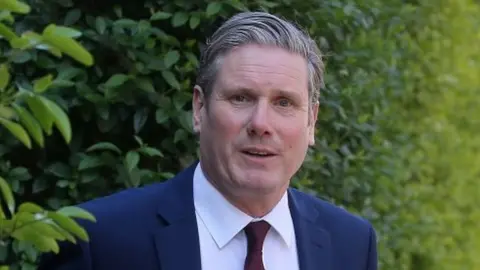 Getty Images
Getty ImagesWhen Sir Keir Starmer was elected Labour leader in April, he made tackling anti-Semitism a top priority, promising to "tear out this poison by its roots" in his acceptance speech.
In a video conference with Jewish leaders, the new Labour leader and his deputy, Angela Rayner, said they would set up an independent complaints procedure and review all outstanding cases.
This was welcomed by Jewish leaders, who said in a joint statement that Sir Keir had "achieved more in four days" than Mr Corbyn did "in four years".
Shortly afterwards, an internal report into the party's handling of anti-Semitism cases, written in the final month of Mr Corbyn's tenure, was leaked.
The 860 page dossier said that factional hostility towards Mr Corbyn's leadership among senior party staff had led to a "litany of mistakes" that hindered the handling of anti-Semitism allegations.
Opponents of Mr Corbyn claimed the report was leaked in an attempt to "smear whistleblowers", who had spoken to the Equalities and Human Rights Commission investigation.
But supporters of the former leader are incensed about alleged evidence that senior former staff members "openly worked against the aims and objectives" of the party leadership.
The report included thousands of emails and private WhatsApp messages, by named individuals, which allegedly show hostility towards Mr Corbyn, party members and policies.
Sir Keir has ordered an inquiry into the contents of the report and how it was leaked to the media, which is still ongoing.
In July this year, the Labour Party agreed to pay "substantial" damages to seven former employees who spoke out about anti-Semitism, in a BBC Panorama programme. The party issued an unreserved apology in the High Court for making "false and defamatory" comments about the seven whistleblowers.
Sacking of Rebecca Long-Bailey
Sir Keir sacked his shadow education secretary Rebecca Long-Bailey in June 2020, saying she had shared an article containing an anti-Semitic conspiracy theory.
Mrs Long-Bailey had retweeted an interview with actor and Labour supporter Maxine Peake, later saying she had not meant to endorse all aspects of the article.
In the article, Ms Peake discussed the police killing of George Floyd in Minneapolis, saying: "The tactics used by the police in America, kneeling on George Floyd's neck, that was learnt from seminars with Israeli secret services."
The Independent article also quoted the Israeli police denying Ms Peake's claim saying: "There is no tactic or protocol that calls to put pressure on the neck or airway."
Ms Peake later tweeted that she had been "inaccurate in my assumption of American police training and its sources".
CORBYN-ERA CONTROVERSIES
Allegations of anti-Semitism against party members and supporters dogged Jeremy Corbyn's four-and-half years as Labour leader.
High-profile suspensions
Among those suspended by the party for alleged anti-Semitism were MP Naz Shah, the ex-London Mayor Ken Livingstone and MP Chris Williamson, an ally and friend of Mr Corbyn.
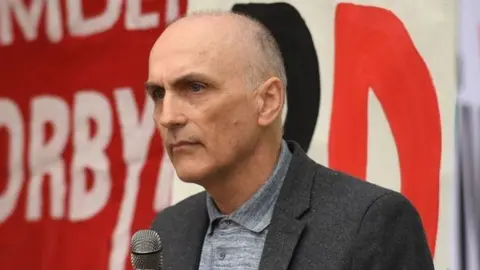 PA
PAMs Shah apologised for a string of comments on Facebook, including one suggesting Israel should be moved to the United States, although she was subsequently re-instated. She has since gone on to play a leading role in the fight against anti-Semitism in the party.
Mr Livingstone quit the party after a long-running row over claims Adolf Hitler had once supported Zionism while Mr Williamson was stripped of his membership for saying the problem of anti-Semitism had been over-stated and Labour had been "too apologetic" over the issue.
Mr Williamson was allowed back into the party several months after his suspension, but was suspended again two days later. pending further consideration of his future. In October 2019, he lost a High Court bid to be reinstated and was unable to stand for re-election as a Labour candidate in Derby North, He stood as an independent but lost his seat.
The Chakrabarti report
In 2016, Jeremy Corbyn asked the barrister and human rights campaigner Shami Chakrabarti - who was appointed a Labour peer soon after her report was published - to look into the extent of anti-Semitism and other forms of racism within the party.
The report concluded that while Labour was not "overrun by anti-Semitism or other forms of racism", there was an "occasionally toxic atmosphere".
It made a series of recommendations to tackle what it said was the "clear evidence of ignorant attitudes" within sections of the party.
The report's launch was marred, though, by a verbal confrontation which led to the expulsion of activist Marc Wadsworth from the party after he criticised a Jewish MP.
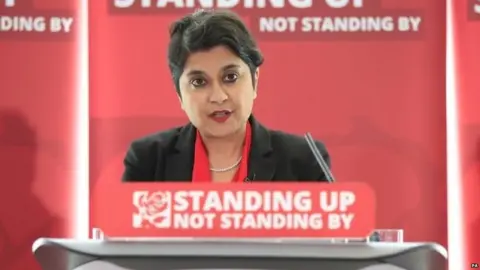 PA
PALabour's former general secretary Jennie Formby said she had strengthened and speeded up the party's disciplinary procedures, with more staff to handle investigations but Baroness Chakrabarti - then Labour's shadow attorney general - criticised the pace of progress.
A 2016 Home Affairs Committee report said the leadership's lack of action "risks lending force to allegations that elements of the Labour movement are institutionally anti-Semitic".
In early 2019, Labour approached former Lord Chancellor Lord Falconer, who replaced Baroness Chakrabarti as the shadow attorney general, about leading a review into its complaints process, which critics said had become politicised.
This, in turn, led to complaints from prominent Jewish MPs that he was too close to the party for any review to be independent.
But in a politically damaging move, the Equality and Human Rights Commission (EHRC) announced its own investigation into anti-Semitism in the party.
It is only the second time the EHRC has investigated a political party - in 2010, it ordered the BNP to re-write its constitution to comply with race relation laws.
A Labour spokesman rejected "any suggestion that the party does not handle ant-Semitism complaints fairly and robustly, or that the party has acted unlawfully".
Panorama row
The party faced further criticism following a BBC Panorama called Is Labour Anti-Semitic?
The programme spoke to a number of party officials who alleged that senior Labour figures - namely Ms Formby and communications chief Seumas Milne, who stood down when Mr Corbyn departed - had interfered in the process of dealing with anti-Semitism complaints.
The disputes team is supposed to operate independently from the party's political structures, including the leader's office.
The whistleblowers also claimed they had faced a huge increase in anti-Semitism complaints since Mr Corbyn became leader in 2015.
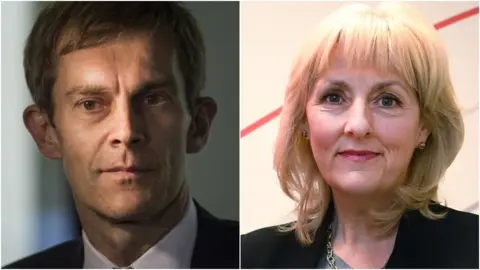 PA Media
PA MediaLabour strenuously disputed the claims, insisting there was no interference and the former staff were "disaffected" individuals with "personal and political axes to grind".
It also said the programme was "heavily slanted and inaccurate" - a suggestion Panorama has rejected.
The party's then deputy leader, Tom Watson, said he "deplored" the official response to the documentary, and other senior figures joined him to call on the leadership to listen to the concerns it raised.
MPs and peers are now pushing for a fully independent complaints process.
Row over international definition
In July 2018, Labour adopted a new anti-Semitism code which critics, including Jewish leaders and some Labour MPs, said fell unacceptably short of the IHRA definition.
Labour's version did not include a number of its examples of anti-Semitism, including:
- accusing Jewish people of being more loyal to Israel than their home country
- requiring higher standards of behaviour from Israel than other nations
Following a consultation - and widespread criticism - Labour subsequently adopted the full IHRA definition and examples, along with an accompanying statement that "this will not in any way undermine freedom of expression on Israel or the rights of Palestinians".
Critics have said the addition of a "caveat" undermines the IHRA definition - but Labour says it is intended to reassure members they can be critical of Israel without being anti-Semitic.
Mr Corbyn proposed a longer additional statement - which would have allowed criticism of the foundation of the state of Israel as a racist endeavour - but this was not accepted by the party's ruling executive.
Jeremy Corbyn's views
Throughout his time as Labour leader, Jeremy Corbyn insisted there was no place in the party for anti-Semitism.
Some of his supporters said the problem had been exaggerated and was being used as a stick to beat him by people who didn't like his leadership of the party or his views on the Middle East.
The former Labour leader comes from a different political tradition than virtually every other post-war Labour leader, having campaigned for 40 years against Western imperialism and aggression.
Mr Corbyn's opponents accused him of being too close to Hamas, a militant Islamist group, and Hezbollah, a Lebanese paramilitary group. Both groups are widely viewed in the West as terrorist organisations.
He described representatives of Hamas as his "friends" after inviting them to a controversial meeting in Parliament in 2009.
He later said he regretted his use of language, but insisted his motivation in talking to enemies of Israel was the promotion of peace in the Middle East.
But his critics argued his views created the space for anti-Semitism to flourish in the party and he had condoned anti-Jewish prejudice through several of his own actions.
The 'English irony' video
Mr Corbyn faced criticism in August 2018 after a video emerged on the Daily Mail website of a 2013 clip in which he said a group of British Zionists "don't understand English irony".
Former chief rabbi Lord Sacks branded the comments "the most offensive statement" by a politician since Enoch Powell's "Rivers of Blood" speech and accused the Labour leader of being an anti-Semite.
Mr Corbyn said he had used the term "Zionist" in an "accurate political sense and not as a euphemism for Jewish people".
He added: "I am now more careful with how I might use the term 'Zionist' because a once self-identifying political term has been increasingly hijacked by anti-Semites as code for Jews."
The Tunis wreath row
In August 2018, the then Labour leader also came under fire over his presence at a ceremony in Tunisia in 2014 which is said to have honoured the perpetrators of the 1972 Munich massacre, during which 11 members of the Israeli Olympic team were taken hostage by Palestinian militants and killed.
The Israeli prime minister Benjamin Netanyahu said Mr Corbyn deserved "unequivocal condemnation" for laying a wreath on the grave of one of those behind the atrocity.
Mr Corbyn tweeted that Mr Netanyahu's claims about his "actions and words are false", adding: "What deserves unequivocal condemnation is the killing of over 160 Palestinian protesters in Gaza by Israeli forces since March, including dozens of children."
Mr Corbyn said he had attended the event in Tunis as part of a wider event about the search for peace.
The Holocaust memorial event
Earlier in August 2018, Jeremy Corbyn apologised over an event he hosted as a backbench MP in 2010 where a Holocaust survivor compared Israel to Nazism.
After the Times published details of the event, the then Labour leader said he had "on occasion appeared on platforms with people whose views I completely reject" and was sorry for the "concerns and anxiety that this has caused".
The mural row
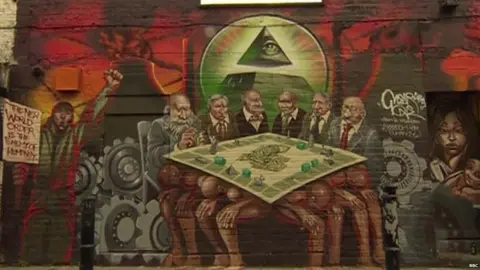
In March 2018, Mr Corbyn was criticised for sending an apparently supportive message to the creator of an allegedly anti-Semitic mural in 2012.
In a message sent via Facebook, he had appeared to question a decision to remove the artist's controversial work from a wall in east London.
He later said he had not looked at it properly, calling it "deeply disturbing and anti-Semitic".
The artist, called Mear One, denied this, saying the mural was about "class and privilege".
Following the row, Mr Corbyn said he was "sincerely sorry for the pain" caused and conceded there were "pockets" of anti-Semitism within the party.
The breakaway MPs
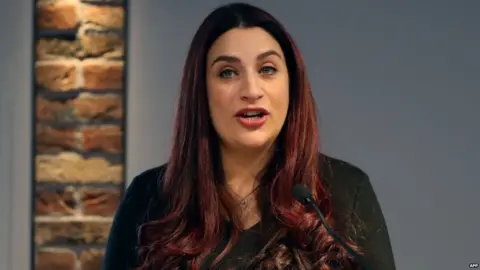 AFP
AFPUnease within Labour ranks in Parliament intensified in 2017 and 2018 amid concerns the leadership was not doing enough to defend Jewish MPs, such as Luciana Berger, who were themselves the targets of anti-Semitic abuse and death threats.
In March 2018, scores of Labour MPs joined Jewish groups, including the Jewish Leadership Council and the Board of Deputies of British Jews, and other anti-racism campaigners to demand action in an unprecedented "Enough is Enough" rally outside Parliament.
In a further sign of the breakdown in trust between Labour and the Jewish community, the Jewish Labour Movement considered severing its century-old affiliation to the party.
While deciding to retain its ties, the organisation of 2,000 members did pass a motion of no confidence in Mr Corbyn and voted to describe the party as "institutionally anti-Semitic".
In February 2019, nine MPs quit Labour, many of them citing the leadership's handling of anti-Semitism as their reason for leaving.
Ms Berger, who had a police escort at the 2018 Labour Party conference, said she had come to the "sickening conclusion" that the party had become institutionally anti-Semitic and that she was "embarrassed and ashamed" to stay.
Ms Berger's supporters, including then deputy leader Tom Watson, claimed she has been "bullied out of her own party by racist thugs".
Among the other defectors, Joan Ryan claimed the party had "become infected with the scourge of anti-Jewish racism" while Ian Austin blamed Mr Corbyn for "creating a culture of extremism and intolerance".
Eight of the defectors joined the newly formed Independent Group, which became Change UK, but three, including Luciana Berger, went on to join the Liberal Democrats, and failed to get elected at the 2019 general election.
The two that remained in Change UK lost their seats, while Gavin Shuker, who stood as an independent, also lost his seat. Joan Ryan and Ann Coffey decided not to stand for re-election.
Ian Austin did not join The Independent Group and stood down at the 2019 general election, advising his constituents to vote Conservative to stop Jeremy Corbyn.
Other controversies
In March 2018, the head of the Labour Party's disputes panel quit after it emerged she had opposed the suspension of a council candidate accused of Holocaust denial.
Christine Shawcroft said she had not not been aware of the "abhorrent" Facebook post that had led to his suspension
In July 2018, the UK's three main Jewish newspapers published the same front page, warning that a government led by Mr Corbyn would pose an "existential threat to Jewish life".
Earlier that month the party brought disciplinary action against the Labour MP Margaret Hodge, after she reportedly called Mr Corbyn an "anti-Semite" and a "racist".
Ms Hodge refused to apologise and the action was later dropped.
Frank Field, the MP for Birkenhead since 1979, quit the party's group in Parliament in August 2018, saying the leadership had become "a force for anti-Semitism in British politics". He stood as an independent at the 2019 general election but lost his seat to the Labour candidate.
In May 2019, a member of Labour's ruling National Executive Committee - Peter Willsman - was suspended after LBC radio reported he had been recorded as saying that the Israeli embassy was "almost certainly" behind the anti-Semitism row.
And Labour's successful candidate in the Peterborough by-election, Lisa Forbes, was engulfed in a row after it emerged she had liked a social media post suggesting Theresa May had a "Zionist slave masters agenda".
She apologised and calls for her to be suspended were rejected but the controversy led to fresh ructions and claims racism had become "institutionalised" within the party.
Correction 26 May 2021: An earlier version of this article reported that 30 members of the International Holocaust Remembrance Alliance (IHRA) had accepted the IHRA's working definition. This was not accurate at the time of writing and this line has been amended in the story.
Update 25th June 2019: Although intended as a general guide, an earlier version of this article omitted some relevant information and it has since been updated.
Correction 23rd July 2019: An earlier version of this article inaccurately said that Labour has never confirmed the number of anti-Semitism cases it is investigating and this has been amended to confirm that the party did release figures for a 10 month period in 2018/19.
